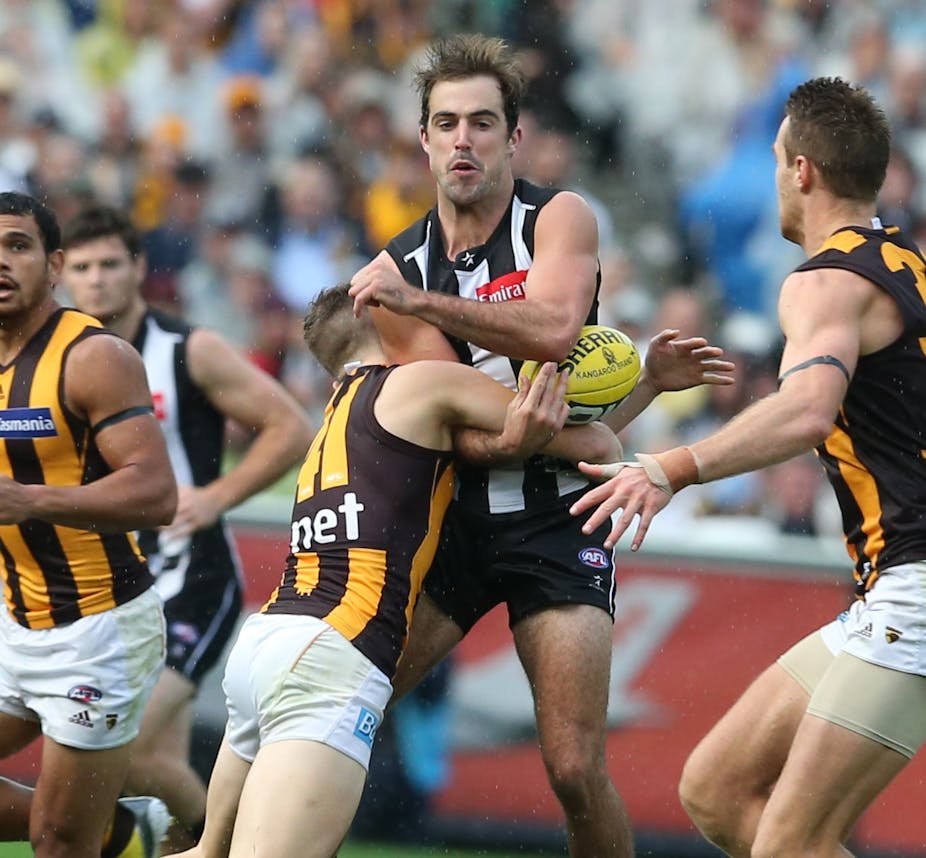Athletes and officials in charge of collision sports (such as rugby league, AFL and American football) have an uneasy relationship with concussion; it’s an unavoidable feature of their games and there’s considerable debate about its short and long-term health effects. But the recent focus on concussion has also highlighted conflicts of interest in its management.
Because these codes cannot eliminate concussion, the National Rugby League (NRL), the Australian Football League (AFL), and the US National Football League (NFL) have all adopted concussion management policies that claim to protect the health and well-being of their players.
These policies involve using computerised neuropsychological (CNP) tests of memory and reaction time to assess the effects of concussion. In Australia and the United States, the most popular of these concussion tests are marketed by the companies ImPACT and CogState/Axon.
Typically (but not always), an athlete is given a “baseline test” at the start of a sporting season and, if he sustains a head injury, his initial results are compared with a follow-up test to determine when he has sufficiently recovered to return to play. These tests are used by elite teams and their use is now being mandated every year by amateur and youth players across the globe.
The major corporate sponsor of the AFL, Toyota, has even agreed to provide CogState/Axon testing for a large number of youth clubs.
Concussion management policies
The major justification for concussion management polices has been provided by a global “consensus statement” for managing concussion in sport. These guidelines were first drafted by an expert panel in 2001, updated at conferences in 2004, 2008, and most recently in 2012.
Over the last decade, neuropsychological concussion tests have been described by these guidelines as contributing significant clinical value to concussion evaluation, and even as a “cornerstone of concussion management”.
On the face of it, these policies seem designed to protect players from suffering the serious consequences of head injuries. But a closer examination of how they were developed reveals financial and professional conflicts of interest among experts who have recommended their use to manage concussion.
Some experts involved in their development have been members of panels at consensus conferences on the management of concussion. And companies that own and market these tests have been major funders of published research used to support using the tests.
Authors of the publications have included employees or part-owners of the companies and physicians who have received research support or been paid consultants to the companies. Some of these experts have also advised professional football leagues on the management of concussion.
It can be difficult to assemble clinical expert panels free of conflicts of interest but when this is not possible, transparency about financial and non-financial conflicts of interest is essential. Until very recently, these international guidelines have not fully disclosed the conflicts of interest of all expert panellists.
Awareness of conflicts of interest
When discussing computerised neuropsychological testing, international guidelines on concussion in sport have also relied on evidence produced by the companies that own and market these tests (CogState and ImPACT).
In other areas of medicine, industry-funded research has been shown to produce results that favour the sponsors’ product. Neutrally sponsored drug trials are much less likely to favour the drug than are trials funded by the pharmaceutical industry.
Collectively, the consensus guidelines have also made little mention of research that has raised doubts about the reliability and utility of computerised neuropsychological tests. A recent study had a group of concussed and non-concussed footballers complete the CogState and ImPACT tests. The researchers also recorded demographic information such as age, IQ and number of previous concussions. Neither CogState or ImPACT were significantly better at predicting the concussion status of the footballers compared to the demographic information alone.
Another review argued that the tests didn’t meet the criteria to warrant routine clinical use. If independent assessment of these tests support the claims made by their designers, then no harm will have been done. But if these tests are not useful in evaluating and managing concussion, then athletes could be mistakenly “passed fit” to return to play and suffer further concussions that may contribute to longer lasting forms of cognitive impairment.
We believe that a high priority should be given to developing evidence-informed policies to manage concussions in sports and that this be done in ways that reduce the potential effects of conflicts of interest on the part of those who design and then evaluate such policies.

